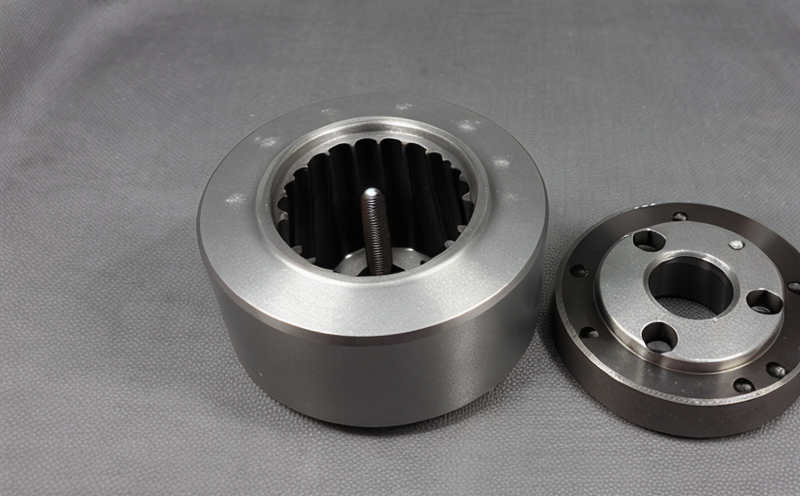ASTM B213 Flow Rate of Powders by Carney Flowmeter
The ASTM B213 standard specifies a method to determine the flow rate of fine powders using the Carney Flowmeter. This test is particularly useful in industries where powder quality and processability are critical, such as metallurgy, additive manufacturing, pharmaceuticals, and electronics. The flow properties of powders can significantly influence processing efficiency, product performance, and overall quality.
The Carney Flowmeter measures the mass of a powder sample that flows through a calibrated orifice within a specified time interval. This measurement provides insights into the cohesiveness, particle size distribution, and shape of the powder particles, which in turn affect how easily they can be handled and processed.
For instance, in metallurgy, understanding the flowability of metal powders is essential for optimizing processes like sintering or additive manufacturing. Poor flow properties can lead to uneven mixing, clogging, and inefficient use of raw materials. The ASTM B213 test ensures that powder characteristics are optimized for optimal process performance.
The testing procedure involves placing a known mass of the powder sample into a container positioned above the Carney Flowmeter orifice. A stop watch is started as soon as the first particle reaches the orifice and stopped when 50 grams (or any other specified amount) have passed through. The time taken for this flow to occur provides the flow rate.
Accurate measurement of powder flow rates helps in selecting appropriate equipment, optimizing production processes, and ensuring product quality. For additive manufacturing, the flowability of metal powders directly impacts print quality, surface finish, and part integrity. In pharmaceuticals, it ensures consistent dosing accuracy and process efficiency.
- Quality Control: Ensures that all batches meet specific standards for powder characteristics.
- Process Optimization: Identifies areas where improvements can be made in powder handling and processing.
- Research & Development: Provides valuable data to improve product design and manufacturing processes.
The ASTM B213 test is widely used across industries due to its robust methodology and reliability. It allows for consistent measurement of powder flow, which is crucial for maintaining high standards in quality control and process optimization.
Why It Matters
The flow rate of powders plays a critical role in determining the efficiency and effectiveness of various industrial processes. In metallurgy and additive manufacturing, the ability to accurately measure and optimize powder flow is paramount for achieving desired product quality and performance.
In metallurgical applications, the flow properties of metal powders directly influence their suitability for different processes such as sintering, casting, and additive manufacturing. Poor flowability can lead to issues like incomplete mixing, poor uniformity in material distribution, and increased wear on processing equipment. By ensuring that powders meet specific flow rate criteria according to ASTM B213, industries can enhance process efficiency and reduce waste.
In the context of additive manufacturing, where precision is key, the flowability of metal powders is critical for achieving optimal print quality, surface finish, and part integrity. The ASTM B213 test provides a standardized method for assessing powder properties, ensuring that only high-quality materials are used in production processes.
For pharmaceuticals and electronics manufacturing, accurate powder handling is essential to ensure consistent dosing accuracy and process efficiency. Poor flowability can lead to inconsistent product quality, increased downtime, and higher operational costs. The ASTM B213 test helps maintain strict standards for powder characteristics, ensuring that only high-quality materials are used in production processes.
The importance of the ASTM B213 test extends beyond just manufacturing; it also plays a crucial role in research and development efforts aimed at improving product design and manufacturing processes. By providing accurate data on powder flow properties, this standard enables engineers and scientists to make informed decisions about material selection and process optimization.
Eurolab Advantages
At Eurolab, we pride ourselves on offering comprehensive services tailored specifically to meet the unique needs of our clients. Our expertise in metallurgy and additive manufacturing ensures that you receive accurate results from your ASTM B213 flow rate tests.
- Comprehensive Testing Capabilities: We have state-of-the-art facilities equipped with advanced instrumentation capable of performing precise measurements according to the ASTM B213 standard.
- Experienced Technicians: Our team consists of highly trained and certified professionals who are well-versed in conducting these tests accurately and efficiently.
- Robust Quality Control: We maintain strict quality control measures throughout each testing process to ensure reliability and accuracy of results.
- Comprehensive Reporting: Our reports provide detailed analysis, including recommendations for improving powder flow properties where necessary.
We understand that every client has different requirements, which is why we offer flexible services designed to suit individual needs. Whether you require one-off tests or ongoing monitoring of your powder flow rates, Eurolab can provide the support and expertise needed to meet your goals.
Quality and Reliability Assurance
- Consistent Results: Our testing procedures adhere strictly to ASTM B213 guidelines, ensuring consistent and reliable results across all samples tested.
- Accurate Measurements: Utilizing high-precision instruments, we guarantee accurate measurements of powder flow rates. This precision is crucial for industries where even small variations in flow properties can have significant impacts on production outcomes.
- Repeatable Processes: Our testing methods are designed to be repeatable, allowing for consistent results over time and across different batches or samples.
- Compliance with Standards: All our tests comply fully with relevant international standards such as ASTM B213. This ensures that the results you receive are not only accurate but also universally accepted within your industry.
The quality of our services is further enhanced by rigorous internal audits and continuous improvement processes aimed at maintaining high standards throughout every aspect of our operations.





